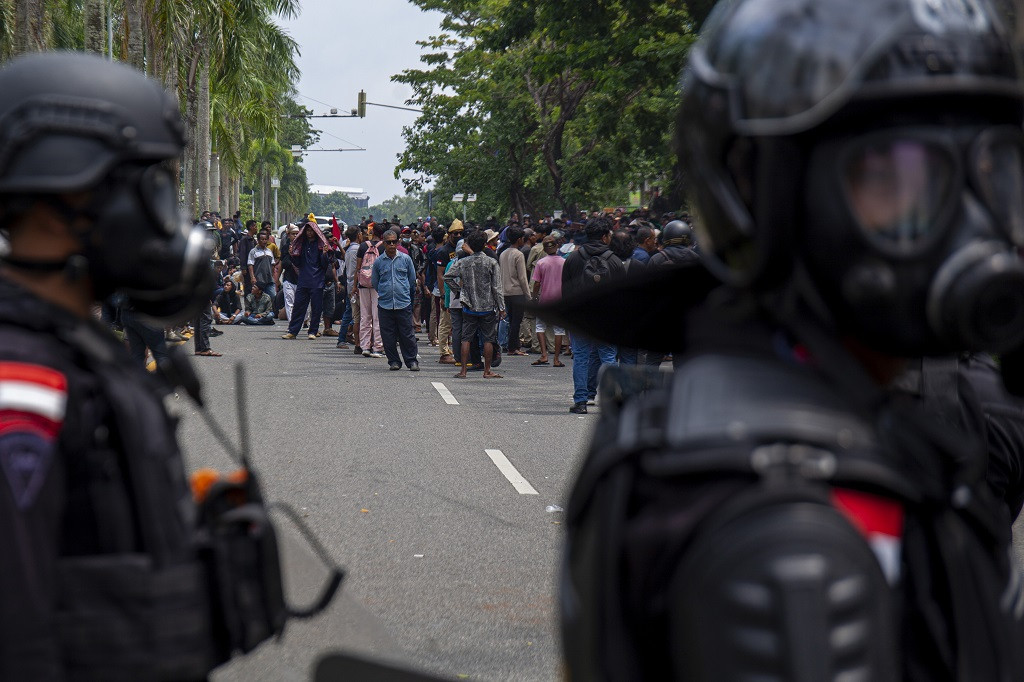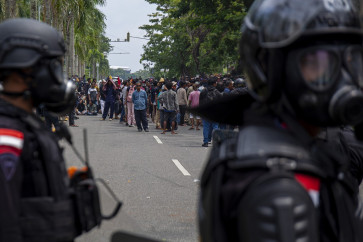Popular Reads
Top Results
Can't find what you're looking for?
View all search resultsPopular Reads
Top Results
Can't find what you're looking for?
View all search resultsNavigating Indonesia’s institutional challenges for inclusive growth
The evidence points to limited public participation in government agendas as the ruling government leans toward acting as an “activist state” in governing the country.
Change text size
Gift Premium Articles
to Anyone
 Riot police stand by on Sept. 11, 2023, during a demonstration by Rempang Island residents at the Batam Concession Agency (BP Batam) in Batam, Riau Islands. The residents reject the local administration's plan to relocate them to another part of the island for the construction of the Rempang Eco City. (Antara/Teguh Priatna)
Riot police stand by on Sept. 11, 2023, during a demonstration by Rempang Island residents at the Batam Concession Agency (BP Batam) in Batam, Riau Islands. The residents reject the local administration's plan to relocate them to another part of the island for the construction of the Rempang Eco City. (Antara/Teguh Priatna)
I
ndonesia's ambitious vision to attain developed nation status by 2045, marked by the goal of possessing the world's fifth largest economy, a per capita annual income of US$25,000 and a gross domestic product (GDP) of $7.3 trillion, places paramount emphasis on inclusive growth. However, the pursuit of inclusive political and economic institutions, vital for national progress, encounters hurdles. The recent Constitutional Court decision, which favored President Joko “Jokowi” Widodo’s eldest son Gibran Rakabuming Raka, underscores the challenges within Indonesia's democratic framework.
The practical necessity of mature democratic systems and a fair business regulatory environment for driving economic growth highlights several areas in need of improvement, a stark reminder that Indonesia's democracy, still in its infancy, requires an unwavering commitment to fortify its foundations.
In the Economist Intelligence Unit's (EIU) democracy index 2022, Indonesia only received an overall score of 6.71 out of 10, classifying it as a “flawed democracy”. Simultaneously, a survey from an Indonesian pollster, Indikator Politik Indonesia, in October 2023 revealed that several primary political institutions, such as the legislative body and political parties, continue to have the two lowest levels of public trust in the country, with “average [trust]” ratings of 62.40 percent and 59.10 percent, respectively.
These figures are lower than public trust in the President (90.40 percent) and the Indonesian Military (93.70 percent). Given the country's current democratic backsliding, this achievement is reasonable.
Among the critical challenges, citizens’ involvement in policymaking carries more weight, underscoring the pivotal role of citizen participation in devising a citizen-centric government and bolstering public value creation. Ideally, political elites should return the mandate of political institutions as mediums to collect the public’s aspirations and realize them into tangible, beneficial outcomes for society.
Therefore, there is no reason to exclude public participation in governmental agendas.
Unfortunately, the evidence portrays otherwise as the ruling government leans toward acting as an “activist state” in governing the country. In reality, the executive body and the supermajority coalition in the legislative body, which already controls 471 of the 575 members in the House of Representatives, tend to avoid public criticism and disagreement during the policymaking process.


















